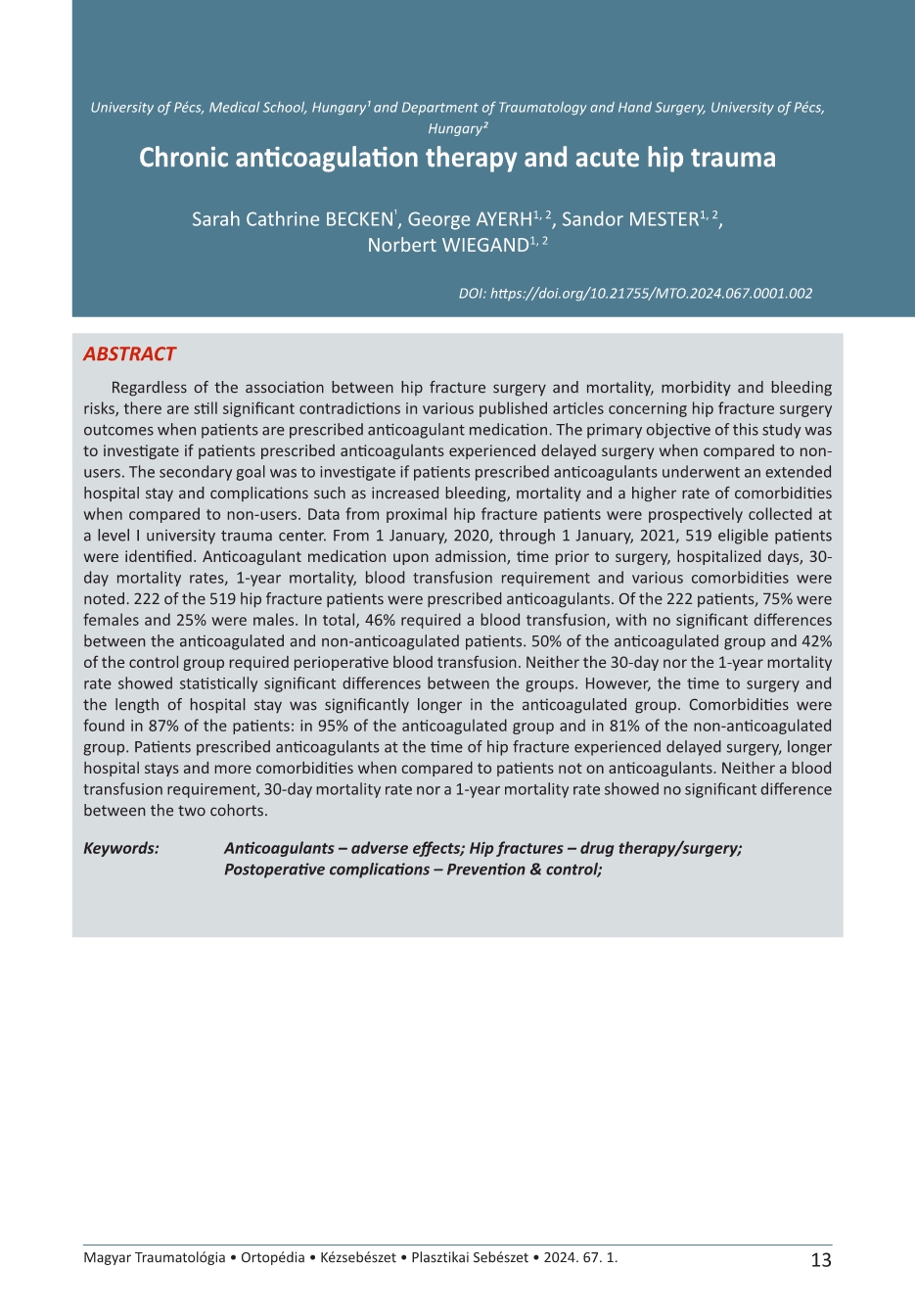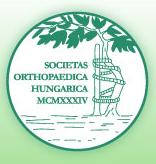Chronic anticoagulation therapy and acute hip trauma
Absztrakt
Regardless of the association between hip fracture surgery and mortality, morbidity and bleeding risks, there are still significant contradictions in various published articles concerning hip fracture surgery outcomes when patients are prescribed anticoagulant medication. The primary objective of this study was to investigate if patients prescribed anticoagulants experienced delayed surgery when compared to non-users. The secondary goal was to investigate if patients prescribed anticoagulants underwent an extended hospital stay and complications such as increased bleeding, mortality and a higher rate of comorbidities when compared to non-users. Data from proximal hip fracture patients were prospectively collected at a level I university trauma center. From 1 January, 2020, through 1 January, 2021, 519 eligible patients were identified. Anticoagulant medication upon admission, time prior to surgery, hospitalized days, 30-day mortality rates, 1-year mortality, blood transfusion requirement and various comorbidities were noted. 222 of the 519 hip fracture patients were prescribed anticoagulants. Of the 222 patients, 75% were females and 25% were males. In total, 46% required a blood transfusion, with no significant differences between the anticoagulated and non-anticoagulated patients. 50% of the anticoagulated group and 42% of the control group required perioperative blood transfusion. Neither the 30-day nor the 1-year mortality rate showed statistically significant differences between the groups. However, the time to surgery and the length of hospital stay was significantly longer in the anticoagulated group. Comorbidities were found in 87% of the patients: in 95% of the anticoagulated group and in 81% of the non-anticoagulated group. Patients prescribed anticoagulants at the time of hip fracture experienced delayed surgery, longer hospital stays and more comorbidities when compared to patients not on anticoagulants. Neither a blood transfusion requirement, 30-day mortality rate nor a 1-year mortality rate showed no significant difference between the two cohorts.
Hivatkozások
Almarshad F, Alaklabi A, Bakhsh E, Pathan A, Almegren M. Use of direct oral anticoagulants in daily practice. Am J Blood Res. 2018. 8(4): 57-72.
Caruso G, Andreotti M, Marko T, Tonon F, Corradi N, Rizzato D, Valentini A, Valpiani G, Massari L. The impact of warfarin on operative delay and 1-year mortality in elderly patients with hip fracture: a retrospective observational study. J Orthop Surg Res. 2019. 14(1): 169. https://doi.org/10.1186/s13018-019-1199-5
Castelli A, Daidone S., Jacobs, R., Kasteridis, P., & Street, A. D. The determinants of costs and length of stay for hip fracture patients. PloSone, 2015. 10(7): e0133545 https://doi.org/10.1371/journal.pone.0133545
Chatziravdeli V, Vasiliadis AV, Vazakidis P, Tsatlidou M, Katsaras GN, Beletsiotis A. The financial burden of delayed hip fracture surgery: A Single-Center experience. Cureus. 2021. 13(3): e13952. https://doi.org/10.7759/cureus.13952
Collinge CA, Kelly KC, Little B, Weaver T, Schuster RD. The effects of clopidogrel (Plavix) and other oral anticoagulants on early hip fracture surgery. J Orthop Trauma. 2012. 26(10): 568-573. https://doi.org/10.1097/BOT.0b013e318240d70f
Daugaard C, Pedersen AB, Kristensen NR, Johnsen SP. Preoperative antithrombotic therapy and risk of blood transfusion and mortality following hip fracture surgery: a Danish nationwide cohort study. Osteoporos Int. 2019. 30(3): 583-591. https://doi.org/10.1007/s00198-018-4786-0
Dettoni F, Castoldi F, Giai Via A, Parisi S, Bonasia DE, Rossi R. Influence of timing and oral anticoagulant/antiplatelet therapy on outcomes of patients affected by hip fractures. Eur J Trauma Emerg Surg. 2011. 37(5): 511-518. https://doi.org/10.1007/s00068-011-0073-x
Hossain FS, Rambani R, Ribee H, Koch L. Is discontinuation of clopidogrel necessary for intracapsular hip fracture surgery Analysis of 102 hemiarthroplasties. J Orthop Traumatol. 2013. 14(3): 171-177. https://doi.org/10.1007/s10195-013-0235-1
Jørgensen NR, Grove EL, Schwarz P, Vestergaard P. Clopidogrel and the risk of osteoporotic fractures: a nationwide cohort study. J Intern Med. 2012. 272(4): 385-393. https://doi.org/10.1111/j.1365-2796.2012.02535.x
Lawrence JE, Fountain DM, Cundall-Curry DJ, Carrothers AD. Do patients taking warfarin experience delays to theatre, longer hospital stay, and poorer survival after hip fracture? Clin Orthop Relat Res. 2017. 475(1). 273-279. https://doi.org/10.1007/s11999-016-5056-0
Leer-Salvesen S, Dybvik E, Ranhoff AH, Husebø BL, Dahl OE, Engesæter LB, Gjertsen JE. Do direct oral anticoagulants (DOACs) cause delayed surgery, longer length of hospital stay, and poorer outcome for hip fracture patients? Eur Geriatr Med. 2020. 11(4): 563-569. https://doi.org/10.1007/s41999-020-00319-w
Levack AE, Moore HG, Stephan SR, Jo S, Schroeder IG, Garlich JM, Hadad A, Little MTM, Miller AN, Lyman S, Lane JM. Chronic warfarin anticoagulation in hip fracture patients delays surgery and is associated with increased risk of postoperative complications: A multicenter Propensity-Score-Matched analysis. J Orthop Trauma. 2023. 37(2): 57-63. https://doi.org/10.2106/JBJS.20.02250
Lieberman JR, Bell JA. Venous thromboembolic prophylaxis after total hip and knee arthroplasty. J Bone Joint Surg Am. 2021. 103(16): 1556-1564. https://doi.org/10.2106/JBJS.20.02250
Lott A, Haglin J, Belayneh R, Konda SR, Leucht P, Egol KA. Does use of oral anticoagulants at the time of admission affect outcomes following hip fracture. Geriatr Orthop Surg Rehabil. 2018. 9: 2151459318764151. https://doi.org/10.1177/2151459318764151
Mattisson L, Lapidus LJ, Enocson A. Is fast reversal and early surgery (within 24 h) in patients on warfarin medication with trochanteric hip fractures safe? A case-control study. BMC Musculoskelet Disord. 2018. 19(1): 203. https://doi.org/10.1186/s12891-018-2126-3
NICE National Institute for Health and Care: Hip fracture: management. Clinical guideline. Published: 22 June 2011. Last updated: 6 January 2023. Retrieved from https://www.nice.org.uk/guidance/cg124/resources/hip-fracture-management-pdf-35109449902789
Pedersen SJ, Borgbjerg FM, Schousboe B, Pedersen BD, Jørgensen HL, Duus BR, Lauritzen JB; Hip Fracture Group of Bispebjerg Hospital. A comprehensive hip fracture program reduces complication rates and mortality. J Am Geriatr Soc. 2008. 56(10): 1831-1838. https://doi.org/10.1111/j.1532-5415.2008.01945.x
Pollmann CT, Røtterud JH, Gjertsen JE, Dahl FA, Lenvik O, Årøen A. Fast track hip fracture care and mortality - an observational study of 2230 patients. BMC Musculoskelet Disord. 2019. 20(1): 248. https://doi.org/10.1186/s12891-019-2637-6
Ranhoff AH, Saltvedt I, Frihagen F, Raeder J, Maini S, Sletvold O. Interdisciplinary care of hip fractures: Orthogeriatric models, alternative models, interdisciplinary teamwork. Best Pract Res Clin Rheumatol. 2019. 33(2): 205-226. https://doi.org/10.1016/j.berh.2019.03.015
Schuetze K, Eickhoff A, Dehner C, Gebhard F, Richter PH. Impact of oral anticoagulation on proximal femur fractures treated within 24 h - A retrospective chart review. Injury. 2019. 50(11): 2040-2044. https://doi.org/10.1016/j.injury.2019.09.011











